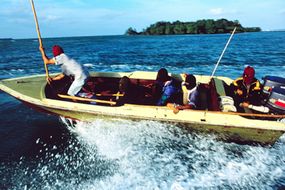Imagine you're traveling across the ocean by ship. You've had a good voyage, with mild weather and smooth seas. You're standing on the deck, enjoying the breeze on your last night on board.
But suddenly, pirates appear on the deck. They demand money, cargo and access to the captain's safe. They take control of the ship and threaten to maroon you and the crew on a nearby island.
Advertisement
You're not on a Spanish galleon, though, and these pirates aren't in curly wigs and waistcoats. It's the present day, you're on a modern cargo ship and the pirates wear military fatigues and carry machine guns. Your ship becomes one of the hundreds to be attacked by pirates every year.
What does it take to be a pirate, and what does it take to survive if you meet one? In this article, we'll look at how pirates work, whether they're robbing and plundering in the 17th century or the 21st.
Being a pirate seems pretty self-explanatory -- pirates use boats to attack other boats with the intent to kidnap, steal or otherwise do harm. But that basic definition doesn't cover it. Violence on the high seas has to meet a few other criteria to be piracy:

- The attack must be for private gain using private vessels. Military activities, environmental protests or acts of industrial espionage are not piracy.
- The pirates must operate outside the authority of any government. In the past, people who behaved like pirates but had governmental authority (often in the form of a Letter of Marque, an official document granting permission to attack and plunder enemy ships) were called privateers. Governments used privateers to harass enemies and supplement navies during times of war. In peacetime, many privateers, including Sir Frances Drake, turned to piracy.
In the past, piracy included attacks on ports and other settlements on land. Most modern laws, though, apply only to attacks on ships at sea. Some laws apply only to ships in international waters, and some apply whether a ship is in motion, at anchor or berthed. In addition, some current definitions of piracy apply only if the attackers use a ship to reach their target. In other words, not every definition of piracy includes people stowing away on a ship in order to attack it at sea.


